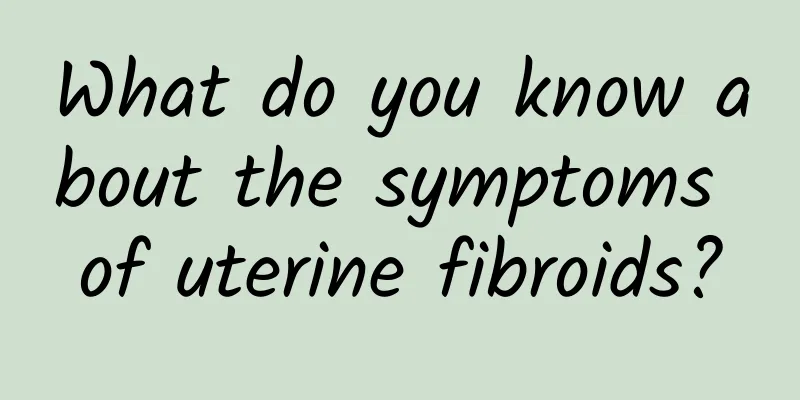What injection can inhibit the growth of uterine fibroids? What injection can inhibit the growth of uterine fibroids?

|
Uterine fibroids are the most common benign tumors in women. Due to their multiple occurrence and easy recurrence, they cause considerable trouble to women's health. In order to inhibit the growth of uterine fibroids, many women choose to control the disease through injections. This article will explore what injections can inhibit the growth of uterine fibroids, introduce commonly used injections and popularize relevant knowledge. The most widely used method for the growth of uterine fibroids is to give hormone therapy. This method can reduce the growth of fibroids by inhibiting the secretion of estrogen. Specifically, commonly used injections include gonadotropin-releasing hormone analogs (GnRH-a), progesterone (P) and long-acting contraceptives (OC). The different mechanisms of action of these injections give them their own advantages in inhibiting the growth of uterine fibroids. The first is GnRH-a drugs. GnRH-a inhibits the secretion of gonadotropin from the anterior pituitary gland and reduces the level of estrogen in the body, thereby inhibiting the growth of uterine fibroids. This type of drug is generally the first choice for treatment within the course of treatment. Common GnRH-a drugs include Leuprorelin, Goserelin, etc. The second is progesterone (P). Progesterone can block the growth of the endometrium and slow down the growth of uterine fibroids by inhibiting the secretion of estrogen. Progesterone is usually given in the form of injections, and common items include progesterone injections. Finally, there are long-acting contraceptives. The estrogen and progesterone in long-acting contraceptives can inhibit the function of the ovaries and thus inhibit the growth of uterine fibroids. This type of drug is generally taken orally, and common ones include ethinyl estradiol and norgestrel. In addition to the commonly used injections mentioned above, there are other drugs that can also be used to inhibit the growth of uterine fibroids. For example, the effective ingredients of traditional Chinese medicines such as almonds, safflower, and dandelions have certain anti-fibroid effects. In addition, there are some methods of regulating the internal environment of the body, such as good eating habits and moderate exercise, which can also play a role in inhibiting the growth of uterine fibroids. Popular science introduction at the end: Uterine fibroids are a common tumor in women, and their growth will have an adverse effect on women's lives. Injections that inhibit uterine fibroids mostly use hormone therapy to slow down their growth rate by regulating the secretion of estrogen in the body. However, different injections are suitable for different conditions. For individual conditions, doctors need to choose the appropriate treatment plan based on comprehensive considerations. In addition, in addition to drug treatment, proper adjustment of diet structure and strengthening of physical exercise can also play a certain inhibitory role. If you find that you have a problem with uterine fibroids, it is recommended to seek medical attention in time and follow the doctor's advice for reasonable treatment. |
>>: What are the consequences of uterine fibroids spreading? Is uterine fibroids spreading serious?
Recommend
How to check for premature ovarian failure
How to check for premature ovarian failure? Prema...
Will fallopian tube adhesions affect menstruation?
Tubal adhesions will not affect menstruation, but...
When is uterine fibroid considered serious? Can uterine fibroids worsen?
How serious are uterine fibroids? Uterine fibroid...
What are the symptoms of cervicitis
The symptoms of cervicitis vary, including abnorm...
What are the symptoms and causes of left ovarian cyst?
Ovarian cysts refer to the formation of cysts in ...
It’s so scary, I gain 3 pounds every Chinese New Year! Nutritionists teach three tips to avoid obesity: Eat healthy snacks wisely
During the Lunar New Year holiday, many people mo...
What are the preventive measures for vaginitis?
The vagina is an important part of a woman. When ...
What is the difference between vulvar leukoplakia, vitiligo and albinism?
Normally we know that many diseases are only diff...
What are the symptoms of cervical erosion?
Cervical erosion is a disease that troubles many ...
How to quickly relieve vulvar itching?
The causes of vulvar itching are different, and t...
What medicine should I take for a 2 cm uterine fibroid? Can a 2 cm uterine fibroid be eliminated by taking medicine?
What medicine should I take for a 2 cm uterine fi...
Under what circumstances should abortion not be performed?
Artificial abortion is a surgical method to termi...
It is necessary for women to understand the early symptoms of pelvic inflammatory disease
Nowadays, many married women suffer from pelvic i...
What are the symptoms of pelvic effusion? What should I do if I find pelvic effusion after pregnancy?
Pelvic effusion is mostly caused by gynecological...
Experts explain dietary considerations for patients with cervical hypertrophy
Cervical hypertrophy is a gynecological disease c...









